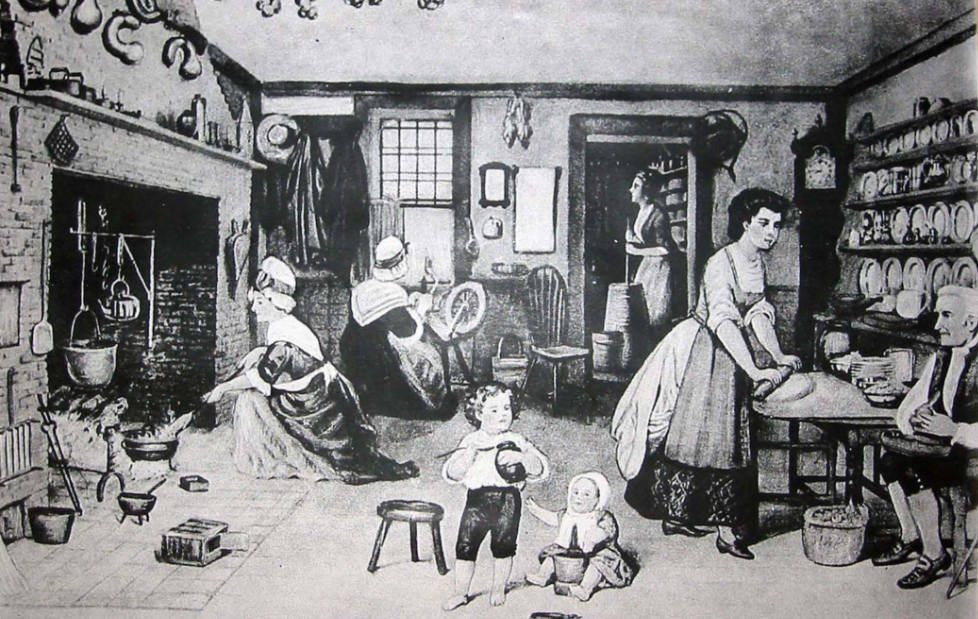Work, work, and more work. That pretty much describes the lives of the colonials, whether it was New England or Virginia. Whether you were male or female, young or old, literate or illiterate, you worked.
What you worked at depended on whether you lived on a farm or in town.
People in town ran small shops, taverns or manufacturing. Men worked in those places with their older sons, by about age 11. The women stayed home, trying to maintain the house, which was often very difficult, unless there were servants. Maintaining the fire, baking, cooking, cleaning, sewing. All this was daily work. The children were expected to watch their younger siblings, help with cooking and cleaning and learn their letters. The idea was that children needed to be trained to do all the things they had to do as adults. Teenaged boys were expected to work in the businesses and learn them from the ground up.
On farms, there was a bigger variety of work. Men had to farm the land, planting food as well as raising animals for meat. They also had to hunt and fish to supplement the meals. Those who had tobacco farms had even more to do, including plucking the flowers off the tobacco plants in order for the leaves to grow bigger. Women were obligated to help with the farm, especially handling the herb gardens and the personal vegetable and fruit plants. It was the woman who would can and dry all the foods come fall. The children began to help by the age of 7 or 8. They could collect eggs, pick flowers off tobacco, run errands, even milk the cows. By 11, the boys could be trusted to work in the fields. Teenage boys were educated enough to copy letters for their fathers (no carbon paper back then) and were junior members of the farm community. Girls were required to learn how to turn wool into thread, use a spinning wheel, run a loom and other things necessary to produce clothing. They could recognize their names when written, but they did not always have benefit of education as the boys did. But they learned how to keep their families warm and fed, which, back then, was more important, anyhow.
What you worked at depended on whether you lived on a farm or in town.
People in town ran small shops, taverns or manufacturing. Men worked in those places with their older sons, by about age 11. The women stayed home, trying to maintain the house, which was often very difficult, unless there were servants. Maintaining the fire, baking, cooking, cleaning, sewing. All this was daily work. The children were expected to watch their younger siblings, help with cooking and cleaning and learn their letters. The idea was that children needed to be trained to do all the things they had to do as adults. Teenaged boys were expected to work in the businesses and learn them from the ground up.
On farms, there was a bigger variety of work. Men had to farm the land, planting food as well as raising animals for meat. They also had to hunt and fish to supplement the meals. Those who had tobacco farms had even more to do, including plucking the flowers off the tobacco plants in order for the leaves to grow bigger. Women were obligated to help with the farm, especially handling the herb gardens and the personal vegetable and fruit plants. It was the woman who would can and dry all the foods come fall. The children began to help by the age of 7 or 8. They could collect eggs, pick flowers off tobacco, run errands, even milk the cows. By 11, the boys could be trusted to work in the fields. Teenage boys were educated enough to copy letters for their fathers (no carbon paper back then) and were junior members of the farm community. Girls were required to learn how to turn wool into thread, use a spinning wheel, run a loom and other things necessary to produce clothing. They could recognize their names when written, but they did not always have benefit of education as the boys did. But they learned how to keep their families warm and fed, which, back then, was more important, anyhow.


Recent Comments